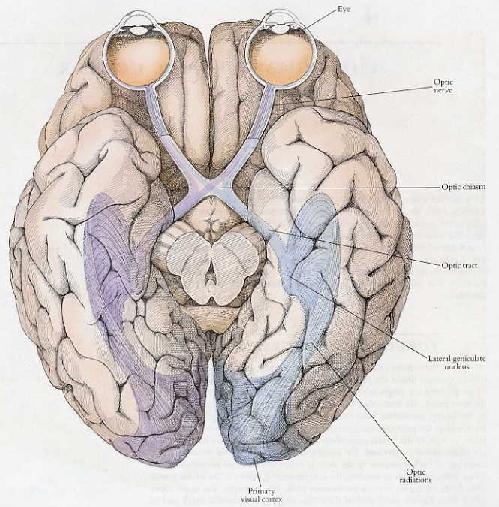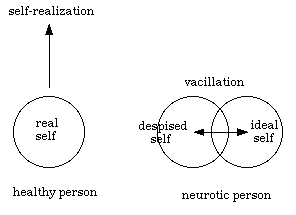 Self Dissatisfaction
Self Dissatisfaction 
Navigating
Karen Horney, M.D.
Neurosis and Human Growth: The struggle toward self realization. (1950)
Overview | morality | neurotic claims | origins of self-estrangement | tyranny of | therapy.

"the neurotic tries to actualize his ideal self with regard to the outside world"
p. 64.
Horney's views of realization and of alienation.
" Forget about the disgraceful creature you actually are; this is how you should be; and to be this idealized self is all that matters."
p. 65.
"Since they are inexorable, I call them 'the tyranny of the should'."
p. 65
"The inner dictates, exactly like political tyranny in a police state, operate with a supreme disregard for the person's own psychic condition--for what he can feel or do as he is at present."
p. 67.
"Neurotic Pride"
"...the neurotic does not gain what he most desperately needs: self-confidence and self-respect."
p. 86.
"Apparently for self confidence to grow, the child needs help from the outside. He needs warmth , feeling welcome, care, protection, an atmosphere of confidence, encouragement in his activities, constructive discipline.
Instead, a combination of injurious influences prevents a child's healthy growth.
Moreover the neurotic development, initiated by the early unfavorable constellation, weakens him at the core of his being. He becomes alienated from himself and divided."
p. 86-87.
the inherent quest for self esteem dictates either a false or genuine sense of self worth, but neurotic pride is manifest concerning imagined or wished for merits, or meritorious character traits. The delusion comes early and is compounded by an inability to distinguish real and imaginary. Social acceptance --as opposed to sanctions-- of the prevailing ideals allow for a person with a lack of self esteem to reinforce the self alienation and compensate for the divided self by fabricating a delightful delusion to be perfect and thus the alienation is compensated for by the development of a fake sense of self worth, which Horney diagnoses as "neurotic pride."
p. 87.
"...the strict cause and effect relation between existing personal assets and the feeling of self confidence."
Even just "a quiet feeling of dignity"
p. 88.
"inner conflict within the Pride system"
"Among the three major solutions of the inner conflict within the pride system the self-effacing seems to be the least satisfactory one."
p. 239
mastery
morbid dependency
Greater subjective feelings of unhappiness
Faced with this situation personalities cannot but be divided
"Erotic love is the only thing that gives positive content to his life."
p. 239.
Oral-erotic stage, often called "parasitic love."
For the dependent minded personality "The appeal is as much in loving as in being loved."
"the longing for surrender and the longing for unity"
p. 240.
Morbid dependency,
"but instead is spellbound by certain types"
Yet these are "but attributes for the lack of which he despises himself"
"a boldness".
p. 243.
Overview | morality | neurotic claims | origins of self-estrangement | tyranny of | therapy | contents
Writing | writing from texts | how to approach writing | writing papers | writing & world views
Science Index | Site Analysis | Population Index | Global Warming Index | Nature Index | Brief


